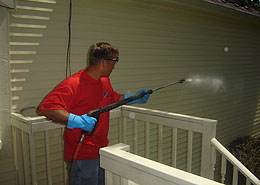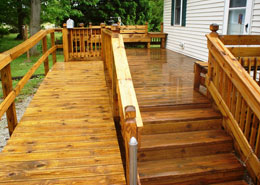Sunday, September 30, 2007
Power Washing in Indiana
Welcome to the blog of Midwest Pro Wash. We are a pressure washing company offering pressure wash services in the northern Indiana area. Some of our services are deck cleaning, concrete cleaning, whole house cleaning, low pressure roof cleaning, building washing, gutter cleaning, and fleet washing. We serve most of northern Indiana, you can visit our website to see if you are included in our service area. We also do something that is unique to the industry, we give consumers free information so they can make an informed and intelligent decision when hiring a power washing contractor. Read our free pro wash report at midwestprowash.com for more information. We have dedicated our business to consumer education and service. Please stop by often for updated tips, news, and information to better help you. Thanks for visiting the blog of Midwest Pro Wash.
Thursday, September 27, 2007
Cleaning Concrete
No matter how much effort you put into cleaning your home, stained driveways and sidewalks will diminish the overall look and take away from the beauty of your property if not cleaned to match. Power washing concrete clean adds curb appeal to your home and will provide a welcome path to your homes entrance. Most people do not realize how dirty their driveway, sidewalks, or patios are until they have them cleaned. A professional house cleaning and concrete cleaning can also and value to your home. The president of the National Association of Real Estate Appraisers says, "a good first appearance on a home can add as much as 5 to10 percent to the value of the home." Concrete cleaning can also save you the cost and trouble of future renovations and replacements due to the negative effects of dirt, mold, and mildew.
Monday, September 24, 2007
Pressure Washing Tips
A pressure washer can have a lot of uses around your property for the do-it-yourselfer. Here are some tips to consider before cleaning up your property.
1. Always wear the proper protective equipment (eye wear, gloves, and ventilation mask).
2. Be sure to check the oil level in your unit’s engine and pump before operating.
3. Always hook up your garden hose and supply water to the unit before starting it.
4. Make sure all pressure hose connections and fittings are properly secured.
5. Check to make sure the unit’s exhaust pipe is free of debris, not too close to any surface that could melt, and that there is adequate ventilation.
6. After starting the power washer, don’t allow the unit to run for more than a minute without circulating water through the pump, this is achieved by pulling the trigger on the wand.
7. When changing wand nozzles be sure the nozzle is fully seated in the wand’s quick connect, you should be able to spin the nozzle if its properly seated.
8. Before pulling the trigger always point the wand in a safe direction.
9. Don’t get too close to surfaces that may be damaged by too much water pressure.
10. Keep the wand tip away from your skin or anybody else’s, even a couple hundred PSI can cause injury to you or others.
11. Change the pump and engine oil once a season.
12. Be sure to antifreeze the pump if being stored outdoors in freezing climates.
13. Don’t take on any projects you feel uncomfortable doing, you can always request a free power washing estimate from a professional.
Following these tips will help to insure your safety and to keep your pressure washing unit running trouble free for years to come.
1. Always wear the proper protective equipment (eye wear, gloves, and ventilation mask).
2. Be sure to check the oil level in your unit’s engine and pump before operating.
3. Always hook up your garden hose and supply water to the unit before starting it.
4. Make sure all pressure hose connections and fittings are properly secured.
5. Check to make sure the unit’s exhaust pipe is free of debris, not too close to any surface that could melt, and that there is adequate ventilation.
6. After starting the power washer, don’t allow the unit to run for more than a minute without circulating water through the pump, this is achieved by pulling the trigger on the wand.
7. When changing wand nozzles be sure the nozzle is fully seated in the wand’s quick connect, you should be able to spin the nozzle if its properly seated.
8. Before pulling the trigger always point the wand in a safe direction.
9. Don’t get too close to surfaces that may be damaged by too much water pressure.
10. Keep the wand tip away from your skin or anybody else’s, even a couple hundred PSI can cause injury to you or others.
11. Change the pump and engine oil once a season.
12. Be sure to antifreeze the pump if being stored outdoors in freezing climates.
13. Don’t take on any projects you feel uncomfortable doing, you can always request a free power washing estimate from a professional.
Following these tips will help to insure your safety and to keep your pressure washing unit running trouble free for years to come.
Monday, September 17, 2007
A Common Mistake About Pressure Washing
Spraying from a ladder or at an upward angle.
Using a pressure washer from a ladder is obviously dangerous and not recommended. Even with a ladder, most of the time you still can't reach the high areas of your home without spraying the vinyl at an upward angle. Doing this forces water under and behind the siding. The weep holes on the bottom lip of siding are meant to drain moisture buildup, not large amounts of water. This leaves water behind the siding, risking water damage. Another trouble spot is the gutters and fascia areas. Dirt and moisture create an electrostatic bond to this type of metal. It takes the right cleaners and equipment to break this bond and get these areas clean again. Ignoring these areas altogether will be risking rot and decay of the wood and other building materials that make up your home. If your thinking about getting a power washing estimate, be sure to discuss these concerns with the contractor.
Using a pressure washer from a ladder is obviously dangerous and not recommended. Even with a ladder, most of the time you still can't reach the high areas of your home without spraying the vinyl at an upward angle. Doing this forces water under and behind the siding. The weep holes on the bottom lip of siding are meant to drain moisture buildup, not large amounts of water. This leaves water behind the siding, risking water damage. Another trouble spot is the gutters and fascia areas. Dirt and moisture create an electrostatic bond to this type of metal. It takes the right cleaners and equipment to break this bond and get these areas clean again. Ignoring these areas altogether will be risking rot and decay of the wood and other building materials that make up your home. If your thinking about getting a power washing estimate, be sure to discuss these concerns with the contractor.
Saturday, September 15, 2007
Another Power Washing Myth
Consumer Grade Cleaners Are Effective
Consumer grade cleaners like house, roof, concrete, or deck wash are safe for consumers to handle. The unfortunate result: they are not effective and in some professionals opinions, are worthless. Not using cleaners at all and relying only on the high pressure from a pressure washer is not a good alternative either. Using "contractor" grade cleaners and low pressure is the only way to completely remove dirt, grime, mold, mildew, algae, cobwebs, and bird droppings safely without causing damage to your property. By using inferior cleaners, or none at all, the contaminates are lessened at best. When mold, mildew, and algae are not killed and removed completely they will return in a short time, jeopardizing your home's value. These contaminates will cause rot, decay, and premature failure of coatings and building materials. Another alternative is to hire a professional pressure washing contractor to do the work for you. Make sure you ask the contractor questions and discuss your concerns before hiring.
Consumer grade cleaners like house, roof, concrete, or deck wash are safe for consumers to handle. The unfortunate result: they are not effective and in some professionals opinions, are worthless. Not using cleaners at all and relying only on the high pressure from a pressure washer is not a good alternative either. Using "contractor" grade cleaners and low pressure is the only way to completely remove dirt, grime, mold, mildew, algae, cobwebs, and bird droppings safely without causing damage to your property. By using inferior cleaners, or none at all, the contaminates are lessened at best. When mold, mildew, and algae are not killed and removed completely they will return in a short time, jeopardizing your home's value. These contaminates will cause rot, decay, and premature failure of coatings and building materials. Another alternative is to hire a professional pressure washing contractor to do the work for you. Make sure you ask the contractor questions and discuss your concerns before hiring.
Friday, September 14, 2007
3 Major Myths About Pressure Washing (a 3 part series)
The More Pressure the Better
Most believe that water pressure (psi) is what does the cleaning; after all, it is called a pressure washer. The truth is that excessive pressure will force water where it’s not wanted and can damage surfaces such as vinyl siding, wood, asphalt shingles, and certain types of brick and concrete. No more than 1,000 psi should be used to clean wood, or wood fibers can be damaged, causing unsightly scars and wand marks that will show through the sealer. More than 800 psi can force water behind vinyl siding causing water damage. No more than garden hose pressure should be used on asphalt shingles, or shingle granules will be washed away, lessening the longevity of your roof. The proper way to clean these surfaces is to rely on the cleaners to do the work and then use low pressure to rinse clean. The lowering of the psi is achieved by changing the tip or nozzle, at the end of your wand, to one with a larger orifice. Make sure the contractor you hire uses the low pressure cleaning method.
Most believe that water pressure (psi) is what does the cleaning; after all, it is called a pressure washer. The truth is that excessive pressure will force water where it’s not wanted and can damage surfaces such as vinyl siding, wood, asphalt shingles, and certain types of brick and concrete. No more than 1,000 psi should be used to clean wood, or wood fibers can be damaged, causing unsightly scars and wand marks that will show through the sealer. More than 800 psi can force water behind vinyl siding causing water damage. No more than garden hose pressure should be used on asphalt shingles, or shingle granules will be washed away, lessening the longevity of your roof. The proper way to clean these surfaces is to rely on the cleaners to do the work and then use low pressure to rinse clean. The lowering of the psi is achieved by changing the tip or nozzle, at the end of your wand, to one with a larger orifice. Make sure the contractor you hire uses the low pressure cleaning method.
Subscribe to:
Posts (Atom)

